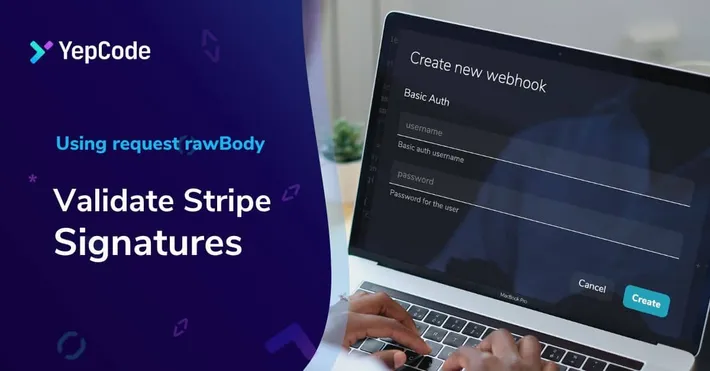Validate Stripe Webhook Signatures using request raw body
Date review:

When handling Stripe webhooks, it’s crucial to verify that the requests actually come from Stripe. This prevents malicious actors from sending fake payment notifications to your system.
Stripe uses HMAC-SHA256 signatures to ensure webhook authenticity, and YepCode’s raw body access makes verification straightforward and secure.
Setup
- Create a webhook endpoint in your Stripe Dashboard pointing to your YepCode webhook:
https://cloud.yepcode.io/api/<your-team>/webhooks/<your-process-slug>- Copy the webhook signing secret from Stripe (starts with
whsec_) - Store the secret securely in YepCode team variables as
STRIPE_WEBHOOK_SECRETor any other name you prefer.
Signature Verification Implementation
const crypto = require("crypto");
const { context: { request },} = yepcode;
const webhookSecret = process.env.STRIPE_WEBHOOK_SECRET;
// Get the Stripe signature from headersconst stripeSignature = request.headers["stripe-signature"];
if (!stripeSignature) { return { status: 400, body: { error: "Missing Stripe signature header" }, };}
// Verify the webhook signaturetry { // Parse the signature header (format: t=timestamp,v1=signature) const signatures = stripeSignature.split(",").reduce((acc, pair) => { const [key, value] = pair.split("="); acc[key] = value; return acc; }, {});
const timestamp = signatures.t; const receivedSignature = signatures.v1;
if (!timestamp || !receivedSignature) { console.error("Missing timestamp or signature in Stripe header"); return { status: 401, body: { error: "Invalid signature format" }, }; }
// Check timestamp to prevent replay attacks (allow up to 5 minutes) const currentTime = Math.floor(Date.now() / 1000); const webhookTime = parseInt(timestamp); const tolerance = 300; // 5 minutes in seconds
if (Math.abs(currentTime - webhookTime) > tolerance) { console.error("Webhook timestamp too old, possible replay attack"); return { status: 401, body: { error: "Request timestamp too old" }, }; }
// Create the signed payload (timestamp + raw body) const signedPayload = timestamp + "." + request.rawBody;
const expectedSignature = crypto .createHmac("sha256", webhookSecret) .update(signedPayload) .digest("hex");
if (receivedSignature !== expectedSignature) { console.error("Stripe webhook signature verification failed"); return { status: 401, body: { error: "Invalid signature" }, }; }
console.log("✅ Stripe webhook signature verified successfully");
// Parse the webhook payload const event = JSON.parse(request.rawBody); console.log(`Processing event: ${event.type}`);
// Your business logic here
return { status: 200, body: { received: true }, };} catch (error) { console.error("Error processing Stripe webhook:", error); return { status: 500, body: { error: "Internal server error" }, };}import hmacimport hashlibimport jsonimport os
def main(): request = yepcode.context.request
webhook_secret = os.getenv("STRIPE_WEBHOOK_SECRET")
# Get the Stripe signature from headers stripe_signature = request.get("headers", {}).get("stripe-signature", "")
if not stripe_signature: return {"status": 400, "body": {"error": "Missing Stripe signature header"}}
# Verify the webhook signature try: # Parse the signature header (format: t=timestamp,v1=signature) signatures = {} for pair in stripe_signature.split(","): key, value = pair.split("=", 1) signatures[key] = value
timestamp = signatures.get("t", "") received_signature = signatures.get("v1", "")
if not timestamp or not received_signature: print("Missing timestamp or signature in Stripe header") return {"status": 401, "body": {"error": "Invalid signature format"}}
# Check timestamp to prevent replay attacks (allow up to 5 minutes) import time current_time = int(time.time()) webhook_time = int(timestamp) tolerance = 300 # 5 minutes in seconds
if abs(current_time - webhook_time) > tolerance: print("Webhook timestamp too old, possible replay attack") return {"status": 401, "body": {"error": "Request timestamp too old"}}
# Create the signed payload (timestamp + raw body) raw_body = request.get("raw_body", "") signed_payload = timestamp + "." + raw_body
expected_signature = hmac.new( webhook_secret.encode(), signed_payload.encode("utf-8"), hashlib.sha256, ).hexdigest()
if received_signature != expected_signature: print("Stripe webhook signature verification failed") return {"status": 401, "body": {"error": "Invalid signature"}}
print("✅ Stripe webhook signature verified successfully")
# Parse the webhook payload event = json.loads(request.get("raw_body", "")) print(f"Processing event: {event.get('type', '')}")
# Your business logic here
return {"status": 200, "body": {"received": True}}
except Exception as error: print(f"Error processing Stripe webhook: {error}") return {"status": 500, "body": {"error": "Internal server error"}}Testing Your Webhook
Use the Stripe CLI to test your webhook:
- Log in to Stripe
stripe login- Forward events to your YepCode webhook. This will listen for stripe events in your current terminal.
stripe listen --forward-to https://cloud.yepcode.io/api/<your-team>/webhooks/<your-process-slug>-
Copy
stripe listenoutput signing secret to your YepCode team variableSTRIPE_WEBHOOK_SECRET. -
Open a new terminal and trigger a test event
stripe trigger payment_intent.succeeded- Check your YepCode execution logs to see the signature verified and event received.
Key Points
- ✅ Use
request raw bodyfor signature verification - ✅ Include timestamp validation to prevent replay attacks
- ✅ Store webhook secrets in YepCode team variables
- ✅ Return proper HTTP status codes (200, 401, 500)
- ✅ Handle exceptions gracefully
The raw body signature verification ensures that webhooks actually come from Stripe, providing a secure foundation for your payment processing workflows.